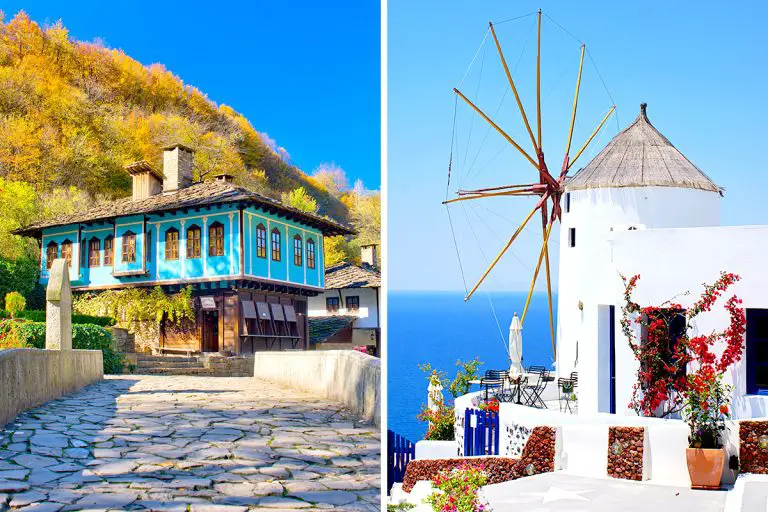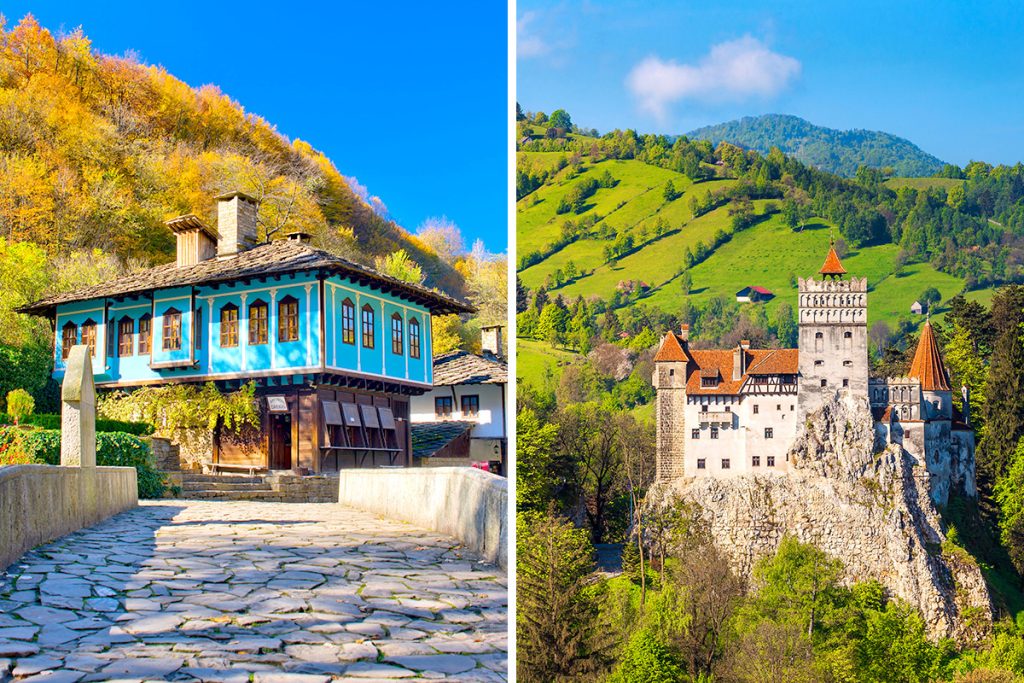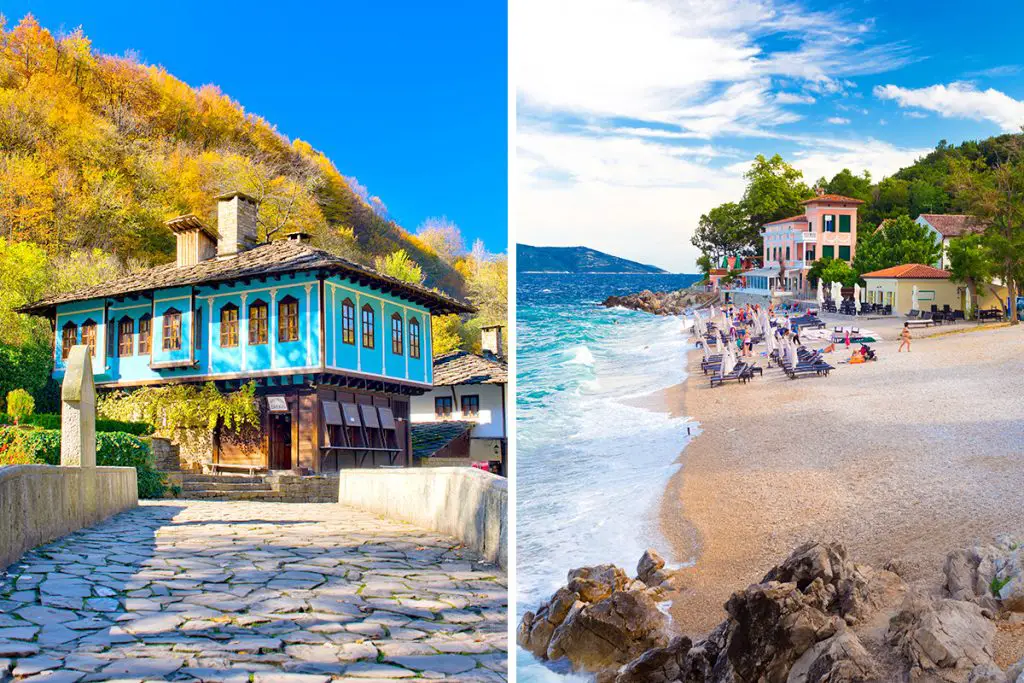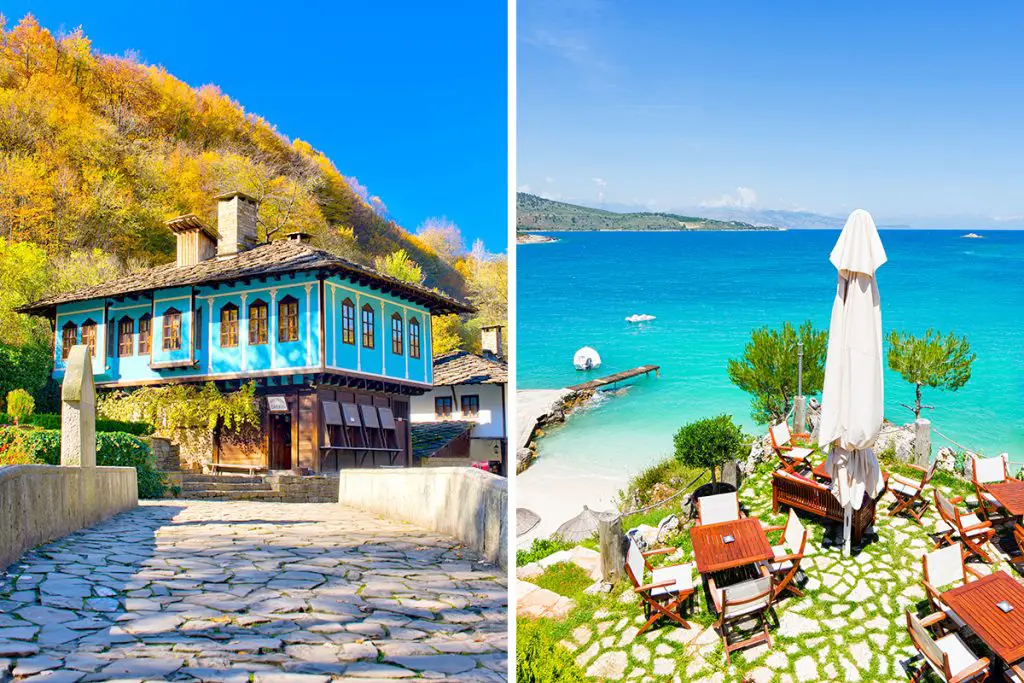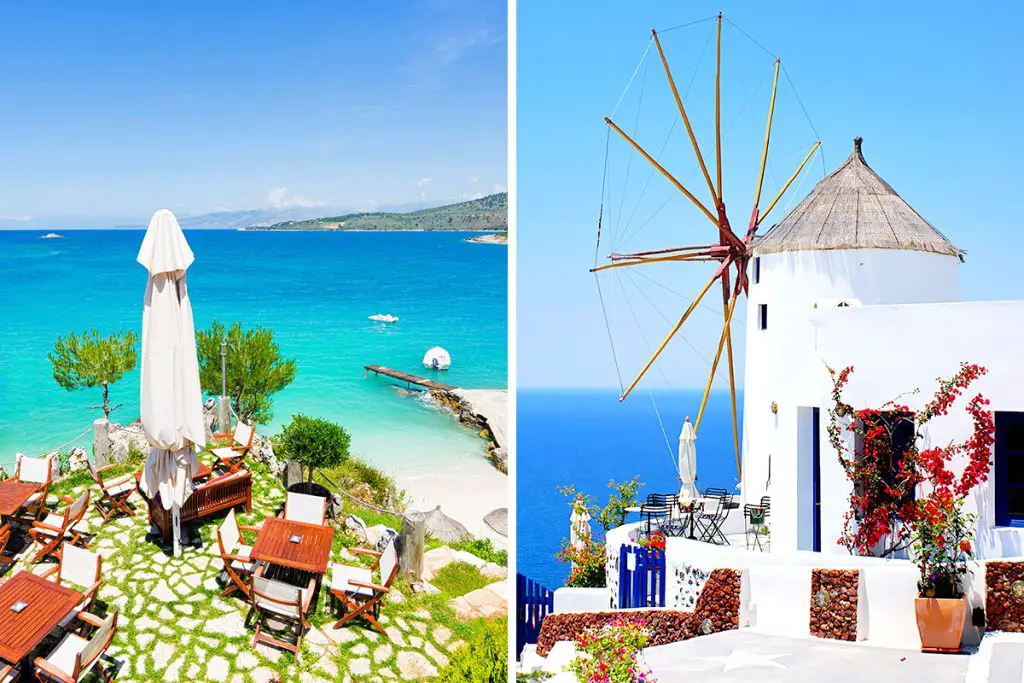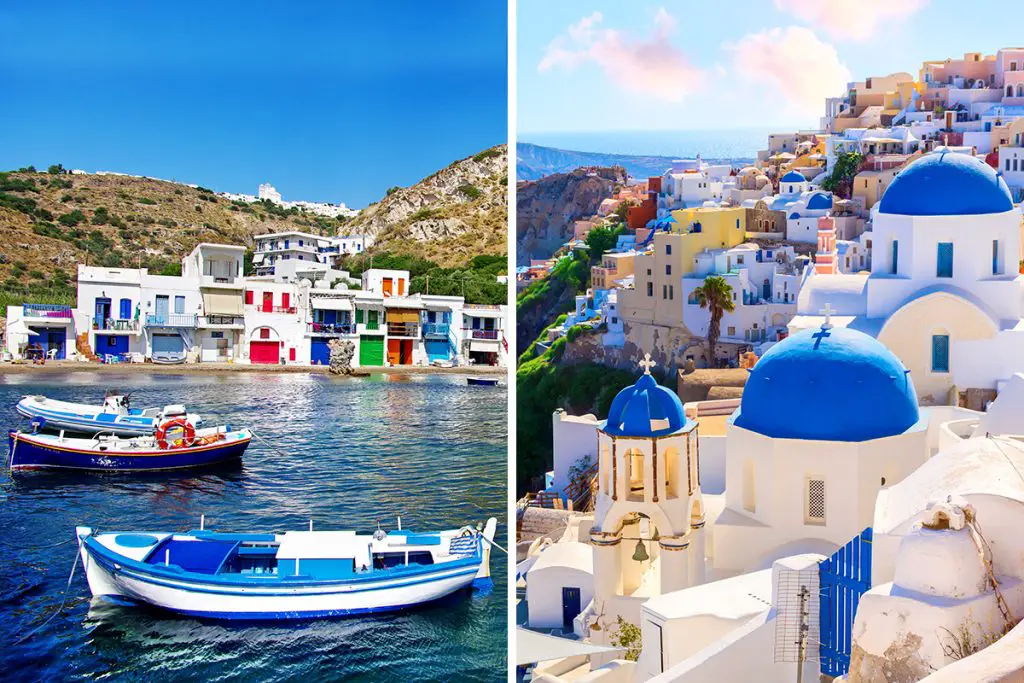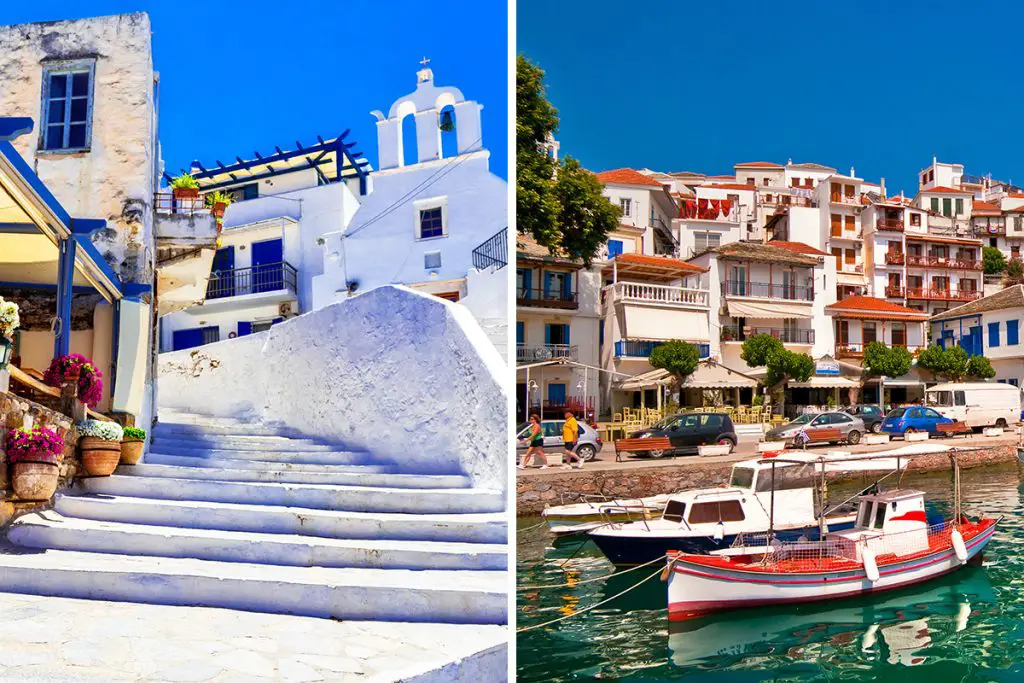Your curiosity about the ancient wonders and lively traditions of Bulgaria and Greece has brought you here. Each land tells a unique tale through its old streets and timeless traditions. Diving into the depths of their historical and cultural essence reveals a treasure trove of experiences waiting for you. So, are you ready to journey through the olden times and lively cultures of Bulgaria and Greece? Your adventure into the past begins now.
History & Culture
Bulgaria and Greece, both nestled in the heart of Southeastern Europe, are lands steeped in history and culture. Their stories have been etched over centuries, painting a vivid picture of Europe’s rich past. You’ll find that each country has a unique way of celebrating its heritage, making them enthralling destinations for those interested in history and culture.
Diving into Bulgaria’s past, you’ll discover a country that’s been at the crossroads of various civilizations. The Thracians, Romans, and Byzantines have all left their mark here, giving Bulgaria a diverse historical canvas.
Greece, on the other hand, is often seen as the cradle of Western civilization with its ancient ruins and stories of legendary gods and heroes. It’s a place where history comes alive, whispering tales of the past through its ancient ruins.
Bulgaria’s culture is a blend of traditions and customs that have evolved over time. The colorful festivals, traditional music, and folk dances are a testament to Bulgaria’s rich cultural heritage. Greece too has a pulsating cultural scene.
The traditional music, dances, and festivals here are a delightful showcase of its enduring cultural spirit. Both countries take immense pride in their traditions, keeping them alive for generations to enjoy.
While both countries have a thriving historical scene, they exhibit it in different ways. Bulgaria has a quiet charm with its well-preserved medieval towns and ancient sites. Greece, however, is more outspoken with its monumental ruins and iconic historical landmarks. Your journey through the historical lanes of these countries will be filled with awe and wonder at every turn.
In summary, the historical and cultural journey through Bulgaria and Greece will leave you with cherished memories and a deeper appreciation for the rich tapestry of experiences that Europe offers. Whether it’s the quiet charm of Bulgaria’s old towns or the monumental allure of Greece’s ancient ruins, your quest for historical and cultural enrichment will find a welcome abode in either of these beautiful countries.
Attractions & Activities
Bulgaria and Greece are treasure troves of attractions and activities that promise endless adventures to those who seek to explore beyond the ordinary. As you venture through these countries, you’ll stumble upon an array of attractions and activities that tell tales of bygone eras and natural wonders.
In Bulgaria, your steps might lead you to the mysterious Belogradchik Rocks, which are majestic rock formations with a history shrouded in legend.
The exploration doesn’t stop there; you can venture into the past at the Tsarevets Fortress in Veliko Tarnovo, where the walls echo the tales of Bulgarian Tsars. The country’s terrains also invite you to explore the great outdoors with hiking adventures in the Pirin National Park, unveiling breathtaking vistas at every turn.
On the flip side, Greece is a haven for history buffs with its iconic sites like the Acropolis in Athens, where you can stand amidst architectural marvels from ancient times. The ancient theatre of Epidaurus is another marvel, showcasing the architectural genius of the Greeks.
Not to forget, the adventurous hikes through the Samaria Gorge in Crete, which offer a blend of natural beauty and a test of endurance, as you traverse through one of the longest gorges in Europe.
The tapestry of attractions and activities in Bulgaria and Greece are as varied as they are fascinating. While Bulgaria offers a quieter yet profound exploration of history and nature, Greece tends to dazzle with its iconic historical sites and dramatic landscapes. Each country holds a unique charm and a promise of adventure that caters to the exploratory spirit of every traveler.
Beaches
The serene shores of Bulgaria and Greece are a realm of relaxation and natural beauty that awaits your discovery. Both countries boast an extensive coastline along the crystal-clear waters of the Mediterranean and Black Sea, promising a blissful escape into the realm of sandy shores and soothing waves.
In Bulgaria, you’ll find the tranquil yet inviting beaches like those in Varna and Burgas. The coastline extends for about 378 kilometers (235 miles), offering a variety of sandy retreats. The gentle waves of the Black Sea provide a calm ambiance for a serene beach day.
Greece, with its extensive coastline of around 13,676 kilometers (8,498 miles), opens up a world of diverse beach experiences. The beaches here, like those in Mykonos and Santorini, are renowned for their crystal-clear waters and stunning views. The azure waters of the Aegean and Ionian Seas create a soothing backdrop for a relaxing day under the sun.
Summing up, whether it’s the peaceful shores of Bulgaria or the lively and scenic beaches of Greece, both destinations offer a unique beach experience. The pristine waters, the gentle caress of the waves, and the soothing sea breeze are common luxuries that await you in both countries. Your love for tranquil shores or scenic beaches will find its match in either Bulgaria or Greece, each with its distinct charm and appeal.
Eating, Drinking & Nightlife
Embarking on a culinary journey in Bulgaria and Greece is like opening a book full of flavorful stories. As you navigate through the eating, drinking, and nightlife scenes of these countries, you’re in for a delightful exploration of unique tastes and lively atmospheres.
In Bulgaria, the culinary scene is a hearty blend of flavors. You might find yourself enjoying a warm bowl of kavarma (a slow-cooked pork and vegetable stew) or savoring the freshness of a shopska salad. The food here is a testament to Bulgaria’s agricultural bounty and the warm hospitality of its people.
In Greece, every meal is a celebration. The olive oil-kissed dishes, such as moussaka and souvlaki, offer a flavorful delve into the country’s rich culinary traditions.
When it comes to sipping a drink, Bulgaria has a rich tradition of winemaking with local varieties like Mavrud and Melnik gaining appreciation. The country’s rakia, a strong fruit brandy, is a traditional favorite that warms you from within.
Over in Greece, ouzo is the national spirit which you’ll often find locals enjoying alongside a meze (a small dish). The wine in Greece is equally captivating, with ancient vineyards producing unique local varietals.
As night descends, the nightlife in Bulgaria offers a cozy atmosphere with its mehanas (traditional taverns) where folk music sets a jovial tone. Greece, on the other hand, is known for its lively nightlife with places like Athens and Thessaloniki buzzing with energy as the night unfolds. The music, dance, and joyous gatherings are a hallmark of Greece’s night scene.
In essence, whether it’s the hearty meals of Bulgaria, the celebratory dishes of Greece, the traditional drinks, or the contrasting nightlife, both countries offer a vibrant and unique experience. Your evenings in Bulgaria and Greece are sure to be filled with flavorful adventures and joyous memories.
Shopping
The markets and shops in Bulgaria and Greece are like colorful palettes, each brush stroke representing different aspects of their rich cultural tapestry. As you stroll through the bustling markets and quaint shops, you’re not just shopping, but embarking on a journey through the crafts, traditions, and modern expressions of these ancient lands.
Bulgaria’s shopping scene offers a blend of traditional crafts and modern fashion. The country is known for its rose oil products, intricately designed ceramics, and colorful textiles. Towns like Troyan and Shipka are well-known for their pottery and rose products respectively. On the other hand, Greece is a haven for lovers of art, jewelry, and natural products.
The islands of Mykonos and Santorini, along with the vibrant city of Athens, offer a range of shopping experiences from high-end boutiques to charming local shops selling handmade crafts and jewelry.
While shopping in Bulgaria, the welcoming nature of the shopkeepers and the rustic charm of the traditional markets is endearing. In Greece, the blend of modern chic and ancient artistry in its shopping scene is captivating. The beautiful pottery, jewelry, and olive oil products are amongst the many treasures you’ll find.
Whether it’s the rose-infused products of Bulgaria or the olive oil-soaked treasures of Greece, each shopping expedition is a unique adventure. The intricate crafts and modern expressions found in the markets and shops of these countries provide a delightful insight into their rich cultural and artistic heritage.
Accommodation
Discovering a comforting place to rest your head after a day full of exploration is essential. In Bulgaria and Greece, the range of accommodations reflects the unique charm and hospitality of these beautiful lands. As you plan your stay, you’ll find a blend of traditional, modern, and picturesque options awaiting you.
Bulgaria showcases a range of accommodation options from quaint guest houses to modern hotels. The traditional Bulgarian houses, with their wooden structures and colorful gardens, offer a cozy and authentic stay. The country also has a variety of modern hotels and resorts that provide a comfortable and luxurious retreat.
Greece, on the other hand, is famous for its iconic white-washed villas and blue-domed structures. Staying in a traditional villa with stunning views of the Aegean Sea is a dream come true for many. Like Bulgaria, Greece also houses a multitude of modern accommodations, from luxurious resorts to stylish boutique hotels.
Both countries offer a chance to experience local hospitality. Whether it’s the warm, welcoming nature of the Bulgarian people or the cheerful and hospitable spirit of the Greeks, your stay is bound to be memorable.
In conclusion, whether nestled in a traditional home or a modern hotel, the accommodations in Bulgaria and Greece provide a comforting and enriching experience. Each country offers a unique taste of its culture right from where you rest, making your stay an integral part of the adventure.
Family-Friendliness & Children’s Activities
Creating unforgettable memories with family is at the heart of every vacation. Bulgaria and Greece, with their rich history and natural beauty, provide a playground for families to explore, learn, and enjoy together.
In Bulgaria, families can delve into history by exploring ancient fortresses or indulge in nature walks in its beautiful national parks. There are also interactive museums and cultural workshops where children can learn traditional crafts in a fun and engaging way.
Greece too has a plethora of family-friendly activities. Visiting the ancient ruins can spark a child’s imagination, making history come alive. Additionally, outdoor adventures like hiking and exploring the numerous islands provide a fun and educational experience for children.
In summary, Bulgaria and Greece cater to family adventures that enrich the mind and spirit. The blend of historical, cultural, and natural attractions provides a fertile ground for families to bond, learn, and create unforgettable memories together.
Getting There & Getting Around
Embarking on a journey to Bulgaria and Greece is the beginning of a rich exploration. Getting to these picturesque lands and navigating through their historic streets is part of the adventure.
To reach Bulgaria, travelers can fly into Sofia, the capital, which is well-connected to many European cities. Greece, being a popular tourist destination, has numerous international airports like those in Athens, Thessaloniki, and many islands. The flight connectivity to Greece from across the globe is extensive.
Once in Bulgaria, the country has a well-organized public transportation system comprising buses and trains, covering a network of 16,100 kilometers (10,000 miles). Greece, with its 80,000 kilometers (49,710 miles) of roadways, also offers extensive bus and train services. However, ferries are a popular mode of transport, especially when exploring the islands.
For a more personalized experience, renting a car in either country is a great option. You can discover new and amazing things as you travel with the liberty of setting your own schedule.
Summarizing, the journey to and through Bulgaria and Greece is made accessible and enjoyable through well-connected transportation networks. Whether by land, sea, or air, the ease of movement allows for a deeper exploration of these captivating lands, adding to the richness of your adventure.
Weather
The weather can significantly influence your experience when exploring Bulgaria and Greece. These countries, while geographically close, offer different climatic experiences that can cater to a variety of preferences.
Bulgaria experiences a continental climate, which means the summers (June to August) are warm with temperatures averaging around 75°F (24°C), while winters (December to February) are cold and snowy with temperatures often dropping to 32°F (0°C) or lower.
The transitional seasons of spring and autumn are mild and pleasant, making them an attractive time for those who prefer moderate temperatures.
Greece, on the other hand, enjoys a Mediterranean climate. Summers are hot and dry with temperatures often soaring to 95°F (35°C) or higher, especially in July and August. Winters are mild, particularly along the coast, with temperatures rarely falling below 50°F (10°C).
The islands and coastal regions are especially attractive during spring (March to May) and autumn (September to November) with temperate weather and fewer crowds.
The mountainous terrains in Bulgaria can offer cooler retreats during the summer, while the coastal regions in Greece provide a warm escape during the winter months. The distinct climatic conditions in both countries cater to a range of preferences, whether you’re seeking a sunny beach holiday or a snowy mountain retreat.
Safety
Ensuring a safe and secure environment is crucial for a fulfilling travel experience. Both Bulgaria and Greece are known to be safe destinations with their own set of considerations.
Bulgaria has a low crime rate and is generally safe for tourists. However, like many places, it’s advisable to be cautious of pickpocketing in crowded areas and to keep your belongings secure.
Greece also boasts a low crime rate, making it a favorable destination for travelers. The locals are known for their hospitality and are often willing to assist tourists.
Unique to the region, earthquakes are a natural phenomenon that occurs in both Bulgaria and Greece. While they are usually mild and rarely cause significant damage, it’s a good idea to be aware of safety procedures in the event of seismic activity.
In conclusion, both Bulgaria and Greece offer a safe and welcoming environment for travelers. Being aware of your surroundings and understanding the local safety guidelines can contribute to a more secure and enjoyable trip.
Cost
Budgeting for your trip is a crucial aspect of the planning process. Understanding the cost dynamics in Bulgaria and Greece will help you tailor your adventure to your financial preferences.
In Bulgaria, your money can go a long way. A hearty meal might cost around 15 Bulgarian Lev (approximately 8 USD), while a decent 3-star lodging facility can go for 100 USD per night.
Transportation is also quite affordable with bus and train fares usually under 20 Bulgarian Lev (approximately 11 USD).
On the flip side, Greece, being a popular tourist destination, can be a bit pricier. A meal at a modest restaurant might cost around 12 Euro (approximately 13 USD) and accommodation in a standard hotel can average 190 USD per night.
Transportation costs are also higher compared to Bulgaria, with inter-city train or bus fares often exceeding 20 Euro (approximately 21 USD).
In essence, while both Bulgaria and Greece offer rich experiences, Bulgaria is the more budget-friendly option. Your costs for food, lodging, and transportation in Greece are likely to be higher. Regardless of your choice, both countries promise an enriching adventure filled with memorable experiences.
Which Is Better – Bulgaria or Greece?
Embarking on a journey to either Bulgaria or Greece promises a rich tapestry of experiences. The historical richness, the inviting beaches, the enticing culinary scenes, and the comforting accommodations are just a few aspects that make these countries remarkable.
Yet, when pitted against each other, how do Bulgaria and Greece compare? Let’s delve into a summary based on the various facets explored.
The historical and cultural richness of both countries is undeniable. Bulgaria, with its medley of civilizations contributing to its historical canvas, offers a quieter charm. Greece, being the cradle of Western civilization, dazzles with its iconic ancient ruins.
Both countries celebrate their heritage vibrantly, yet Greece offers a more monumental historical experience with its ancient ruins and tales of legendary gods.
When it comes to attractions and activities, Bulgaria provides a peaceful retreat with its natural wonders like the Belogradchik Rocks and the picturesque Pirin National Park. Greece, on the other hand, offers a blend of historical and natural attractions, with its ancient ruins and adventurous hikes through the Samaria Gorge in Crete being particularly enticing.
The serene shores of Bulgaria provide a tranquil beach experience, while Greece, with its extensive coastline and azure waters, offers a more lively and picturesque beach ambiance. The choice between the peaceful beaches of Bulgaria and the scenic shores of Greece will cater to different preferences.
The culinary journey in Bulgaria is hearty and welcoming, while in Greece, it’s a celebratory affair with a splash of Mediterranean flavors. The nightlife in Greece is more vibrant with a lively scene in cities like Athens, as opposed to the cozy atmosphere of Bulgaria’s traditional taverns.
Shopping in both destinations is a dive into their rich cultural and artistic heritage. However, Greece, with its blend of modern chic and ancient artistry, offers a slightly more varied shopping experience compared to the rustic charm of Bulgaria’s traditional markets.
The accommodations in both countries provide a range of options to suit different preferences. Bulgaria tends to be more budget-friendly, making it an attractive choice for travelers on a budget, while Greece offers a more luxurious retreat, especially in its iconic white-washed villas with stunning sea views.
In essence, your choice between Bulgaria and Greece will hinge on personal preferences. Bulgaria is a perfect escape for those seeking a peaceful, budget-friendly retreat rich in history and natural beauty. Greece, while pricier, offers a lively, picturesque, and historically rich experience that’s hard to match. Whether you choose the tranquil charm of Bulgaria or the vibrant allure of Greece, both destinations promise a unique and enriching adventure waiting to unfold.

